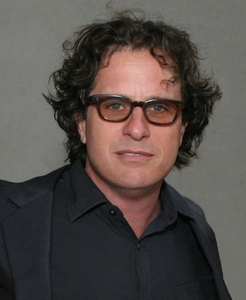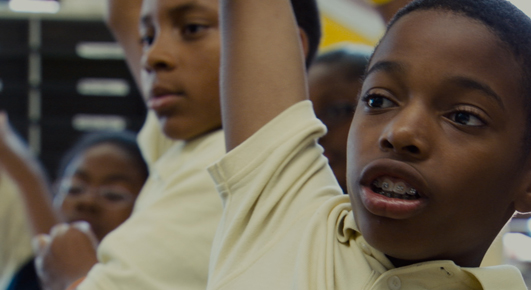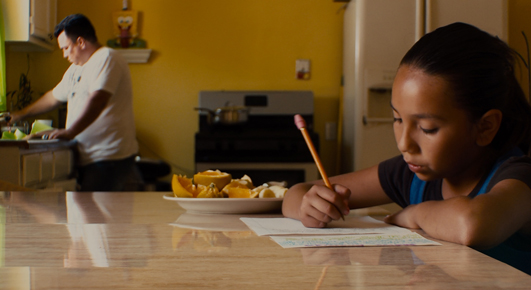
Features
Interviews

Interview: Waiting for 'Superman' director Davis Guggenheim
Filed under: Interviews
Davis Guggenheim didn't start out intending to make documentaries, even though his father Charles had directed many during his career. After working in television for many years, Guggenheim was planning to direct the Denzel Washington film Training Day, but was replaced before filming began, and instead he ended up making The First Year, a TV documentary about the school system.
Nine years and an Academy Award later (Guggenheim won an Oscar for directing the Al Gore-fronted An Inconvenient Truth), he's back with another documentary examining the American public school system. Waiting for 'Superman' has been getting a lot of buzz, playing at the Toronto and Vancouver International Film Festivals and receiving critical acclaim. However, it's also been facing some controversy from teachers and others involved in the school system.
We got the chance to participate in a round table interview with Guggenheim while in Vancouver promoting the film at VIFF, and he was asked about the content of the film, its controversy, and his hopes for what can fix a system that is regularly ranked near the bottom of developed countries. Waiting for 'Superman', already playing in limited release in several U.S. cities, hits theatres in Vancouver, Calgary, and Edmonton on Friday, October 15th.
MM: Now Waiting for 'Superman' is your second film on the subject of education. Just how important is that subject to you both personally and professionally?
Davis Guggenheim: It's funny, I never really wanted to be a documentary filmmaker. Before that first movie, I was going to direct Training Day. I had sold the script to Warner Bros., I convinced them finally to hire Denzel Washington, and then he didn't want me to direct so then I got fired. That was really my dream to be a Hollywood director, and I was so upset after I got fired. It was so arbitrary and stupid, so I bought a camera, this little small one, and said, "I'm going to make a film about people I like." I followed these five teachers and I spent a year doing so. It was the very first movie that was really mine, that I ever made. When you spend time in these schools where there's a lot of need, you realize this is where everything counts. These teachers are doing incredible jobs and kids' futures are literally at stake. I think I'll probably be making movies about education forever until we fix it. It's funny, because life sends you in directions you didn't (think). Now I think it's just about the best thing that could have happened. I'm not sure about from a Canadian point of view, but from an American one it just seems as the roots of all our problems come out of education. Our greatest successes come out of education and we are so screwed right now that we really need to do something about it.
When you were preparing for the documentary, did you read about other school systems, and was there a model that you sort of recommended to the U.S.?
DG: We studied a number of systems -- Japan, Korea -- and America's system is so unique to America that it was hard to make direct comparisons. Finland is sort of the top of all the lists. What's unfair to compare with Finland is that it's a very homogeneous country, and they don't really have many of the sort of social issues that America has. What they do right and what we can learn from them is an emphasis on great teachers. It's really hard to get into a teaching program and to get a spot, and once you do get a spot, you are developed and trained, and once you've been a teacher and you want to leave, you can get any job you want. In America, that's the opposite of the case. The core of education is really great teachers and we're just not doing that in America.
With the new laws dealing with immigrants, does that have any repercussions on the education system.
DG: It's very controversial when I do these Q&As or round tables in Texas, because a lot of people are really upset because schools have to accept all these immigrants and illegal aliens and suddenly it becomes more complicated. I hope it doesn't. When America does things right -- in the past we've had many many immigrants come in over the years, my great grandparents are immigrants and they didn't speak the language or have any money, and education was this great elevator and it lifted families. So I think America should commit to giving every kid a great education and make it so you don't have to win the lottery to get on the elevator.

How were you able to distance yourself and not let your emotions impact the film itself?
DG: Part of what drives me as a filmmaker is emotion, and when I feel passionate about something, that's when I want to go make a movie about it. In the absence of passion, I tend to stay away. You have to feel deeply about it and care about the people in your movie and find a way to make the audience care as much as you do. That's essential, but you also can't cross certain lines like when Bianca couldn't go to graduation because her mother couldn't afford it, I was like, "Let's go to the bank and give her the money to do so." But that sort of thing would cross the line and that's heartbreaking because you're making the movie to get these people some help and avoid this sort of stuff, but out of principle you're not allowed to help. My hope is that the movie will encourage others to help. There's sort of a myth about documentaries, a misconception that you have to be sort of cold and objective and clinically dispassionate, and I don't believe it. I think the audience wants you to pour your heart out.
Since the movie premiered, have there been any changes?
DG: If you had told me a year ago that these things would be changing, I'd have been surprised. Since we finished the movie, the "rubber rooms" have been shut down. Now they haven't dealt with the teachers yet, so they still have these teachers that are on payroll and can't teach, and it's still a hundred million dollars to the system. They are talking about having a quicker procedure than the 3-year system. Mayor Bloomberg of New York had a speech and the first thing he talked about was Waiting for 'Superman' and the next thing was re-thinking teacher tenure. Obama saw the movie and called it powerful and the next thing he said was that we have to have more school days. A lot of the messages of the movie are being talked about and there are new contracts and laws. Randi Weisgarden, the head of the American Association of Teachers, is now a part of some new negotiations about tenure and pay. It's really important to know what movies can and can't do. Movies cannot teach a kid and they cannot write laws but they can lift the discussion and put pressure on the leaders who might be stuck in their position and get them to make the changes sooner.
Your movie talked a lot about the American public school system. What are your thoughts and politics on the alternatives like the voucher system?
DG: What I really hate is this debate that happens in America, and it's the "either/or" debate. It's like charters are the silver bullet which they are not, or they are the death of the system which they are not. Vouchers are incredible or they are terrible, and they're neither. I'm actually of a mind that the system is so broken, that I like the idea of trying a lot of things. Vouchers became so politicized and they became dead in the water right now, but the idea of giving a parent a choice to move their kid to another school with a voucher is one that I like. The problem is that the education war is so politicized. The breakthrough for this movie is to tell the story from the position of a parent, and if you're a grandparent, and you're looking for a good school. For a lot of people, there's a school you get and you don't have the money to move or for private school. Any way we can give the parents more options outside this broken system (is good).
Mark McLeod: You spoke earlier about the need for having a "good teacher". Just how important is that to you, and did you have one growing up?
DG: I think it's impossible to find someone who is successful -- and that's broadly defined -- and not find that they had a great teacher. Maybe (it isn't), and it's an idea I'd like to test. I had a handful of really great teachers, including my father who made documentaries, but people who particularly when I was doing the worst and failing the most or the least confident. That's where our schools are great now and the great teachers that are here and there, and it's really how we're going to lift the system and have great teachers everywhere.

Do you have any ideas for a follow-up similar to the the Seven Up, 21 Up series of films.
DG: That's intriguing. I'm probably too close to the finish of this movie to imagine it, and it's still so recent for the kids, but with that said I am interested to see what is going to happen to them in 5 years and where they'll be.
The documentary deals with 2 of the 3 pieces of the problem -- the system and the unions -- but there's also public opinion. Do you think the film will help deal with that piece?
DG: The film is meant to deal with it, you're absolutely right. The third piece is, and I try to sort of write to it by saying that I drive by three public schools to take my kids to a private school, and the idea that I'm part of the problem. I say how I've betrayed the ideals that I thought I lived by. I take care of my own and stick my head in the sand and wait for the system to change. To me, that's the third piece, is that a movie is supposed to speak to the general population and say this is a serious problem and it's worse than we thought and it affects all of us. It can be done, but you have to take action.
What role do you think the frustration and obstacles faced by the teachers play in this?
DG: I think every teacher becomes a teacher because they want to affect the lives of kids, they have big dreams, and they believe. They are not enticed by money or fame. I think having screened the movie in a lot of cities now that they feel more than anybody how hard it is to work in the system. That's what the movie is about, there's this sort of system in place that makes it really hard on teachers. We're not going to fix the system -- unless we deal with the system, that will not change. We want more money, we want better teachers, and we all want the schools to be better, but the system seems to be crushing everybody. And that was the idea, to show kids just wanting a great school, and that (we have to) deal with those forces, those sort of hidden forces that just want the status quo to stay.
The early criticism of the movie has been that it focuses on the system and the students, but there isn't much focus on the teachers. Can you speak a bit to that?
DG: My first film (The First Year) was all teachers 24/7, and a lot of the characters in this movie were teachers like Geoffrey Canada, Michelle Rhee. And Anthony's grandma would talk about how he has a great teacher this year and is really making progress. I think that a lot of my writing and narration is about how the teachers are a part of the solution. Then there is the unions. There's a lot of criticism that says just because I asked tough questions of the unions that I don't admire and love teachers, and that's just not true. I'm a member of a great union, the Director's Guild of America, and I believe in great unions and I do think the teachers union should be around for a very long time. You are not going to fix our schools unless you talk about them, and if you can't talk about them in a documentary, where can you? I hope that's where the discussion stays constructive as opposed to trying to find some clever angle as to why the film is biased.
Tags: Waiting for 'Superman', Davis Guggenheim, documentary, public school system
Related Posts
- Review: Stan Lee
- Punch Up Your Life - The Height of Depression (Ryan Sheedy)
- Punch Up Your Life - Blacked Out (Chris Middleton)
- Punch Up Your Life - DisFUNction (Hools Kay)
- Punch Up Your Life - The Assorted Spectres of Saint John's Road (Isabel Zaw-Tun)
Mark McLeod has always loved film. In addition to his roles with ShowbizMonkeys.com, Mark also works on many film promotion projects in Vancouver, BC, through his company, Mark McLeod PR.
Original Comments Posted (1)
crimson says...
I love the part of the trailer where the cyclist goes off the ramp and crashes into the side of a building.
But as far as the system goes, I have never heard of the lottery system (probably because I'm Canadian). I'm also of the position that people place too much importance of the education system towards kids. Whether or not people succeed ultimately depend on their own personal ability. And if education is not an option during childhood, there's always the opportunity to take adult education.

SBM on Social Media